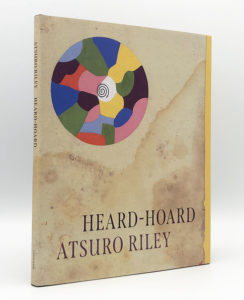Heard-Hoard
GUGGENHEIM FOUNDATION FELLOWSHIP
ARTS AND LETTERS AWARD IN LITERATURE, the AMERICAN ACADEMY OF ARTS AND LETTERS
ALICE FAY di CASTAGNOLA AWARD from THE POETRY SOCIETY OF AMERICA
Finalist, PEN AMERICA’S VOELCKER POETRY AWARD
BOSTON GLOBE—BEST BOOKS of 2021
BOOKWORM—TOP 10 BOOKS of 2021
Recognized for his ‘wildly original’ poetry and his ‘uncanny and unparalleled ability to blend lyric and narrative,’ Atsuro Riley extends and deepens here his uncommon mastery and tang. In Heard-Hoard, Riley has ‘razor-exacted’ and ‘raw-wired’ an absorbing new sequence of poems, a vivid weavework rendering and remembering an American place and its people.
At once an album of tales and portrait gallery and soundscape, ‘inscritched’ dirt-mural and hymnbook, Heard-Hoard encompasses a chorus of voices, shot through as they are with their (mostly human) histories and their mysteries, their ‘old appetites as chronic as tides.’ From the crackling story-man calling us together in the primal circle to Tammy figuring ‘time and time that yonder oak,’ Atsuro Riley’s new collection is a profound evocation of lives and loss and lore, ‘a lit meat-mesh of heards.’
"A superb book about people attempting to make a life together in America."
"The demotic and the literary, the arcane and the ordinary, the ancient and the invented give Riley's work the range it needs to house his vision and his voices."
"This book is crucial to contemporary American poetry because it shows a lyric poet of unique formal gifts doing something we'd usually expect from a great novelist—exploring and rendering our striving to give shape and meaning to our lives together—all while maintaining the force and subtlety of his lyric gift."
"Heard-Hoard contains many examples of wicked desires and violent compulsions—from angry gangs of runaway children to a tormented former prisoner of war—but the 'story-man' represents a way of being together that satisfies our deepest 'appetites' and makes room for our 'souls.'
"The 'rudimental stories' are a way to get and keep access to beauty, despite relentless adversity—and to let beauty, rather than fear, shape one’s body and one’s soul."
"Riley is like a painter who increasingly allows color, form, and texture to be his guide, as he becomes less concerned with making the subject or the narrative explicit to the viewer and more interested in creating universal sensory, emotional, and philosophical effects."
"The stakes here are extraordinarily high: salvation, protection, soul-fashioning.
In these pages, Riley creates a uniquely American idiom—expressive, earthy, and flat-out dazzling—that will slake and succor readers for many years to come."
"Intoxicating. . .Sounds unheard and unrivaled since Atsuro Riley’s acclaimed debut permeate Heard-Hoard. His elegant rhythms are atmospheric and robust, his neologisms transform the “weed-embrangling snuffle-path,” his vernacular is magical as “dew-sparks galaxifying the crabgrass.” Amid each mesmerizing reading, like dancing to a good song for a good long time before truly hearing its lyrics, Heard-Hoard’s remarkable stories crystallize; music becomes narrative. Atsuro Riley is an extraordinary poet. This book is oral, aural and neural in ways I continue to absorb . . .it holds all the meanings of fantastic.
"A vision in which the ancient mythic and the lived moment interpenetrate. . ."
"We gain permission to enter a sacred and strange field, where words don’t describe a life, but a life is inscribed in words. . .”
"In what is to my mind the strongest new book of poetry this year, Atsuro Riley's Heard-Hoard universalizes the trauma of a Carolina childhood. He restores the memories of what he heard —— the mountains of language that ensnare and liberate us all. It's a magnificent followup to his award-winning Romey's Order published eleven years ago. A long-awaited and satisfying book." (Michael Silverblatt)
"No one in American poetry has a voicebox quite like Atsuro Riley’s — trained by ear on a mother’s native Japanese, the raised vowels of the South Carolina Lowcountry, and Gerard Manley Hopkins’s hyphen-happy, consonant-crowded compounds. In Heard-Hoard, his second collection, Riley lends his inimitable instrument to boyhood acquaintances and communal complaints: “We come gnawed by need on hands and knees." (Christopher Spaide)
